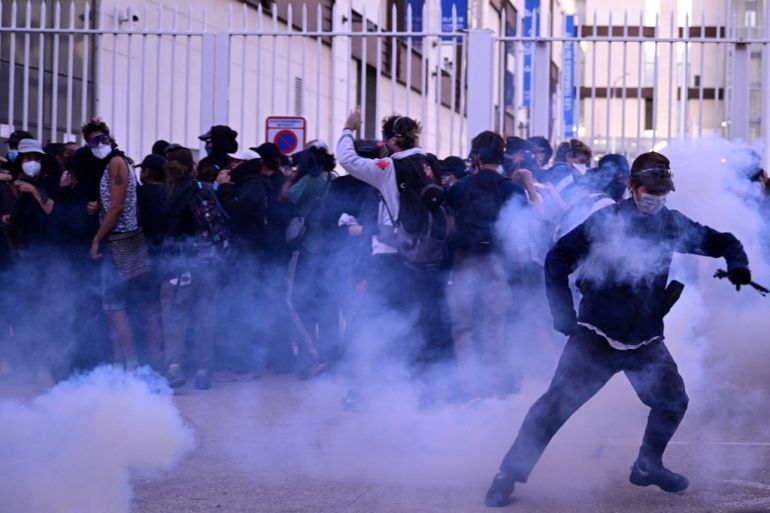France braces for mass protests as austerity plan deepens anti-Macron anger
Government warns of disruptions as nationwide strikes set to shutdown schools, pharmacies and transport.

By Elis Gjevori and News Agencies
Published On 18 Sep 202518 Sep 2025
Save
France is braced for nationwide disruption as unions launch mass strikes to protest against government proposals for budget cuts.
The walkout by teachers, health workers, and transport staff, among others, on Thursday is expected to paralyse parts of the country, with unions promising one of the largest mobilisations since last year’s bitter battle over pension reform.
Recommended Stories
list of 3 itemsend of list
The action has been spurred by austerity plans, which have increased anger against President Emmanuel Macron. The head of state has seen his popularity drop to new lows amid a government crisis that shows little sign of dissipating despite a recent change of prime minister.
The strikes will see one-third of teachers walk out, nine in 10 pharmacies closed, and severe disruption across the Paris Metro. Only three driverless lines are expected to run normally.
While most high-speed trains are likely to run, Metro and suburban rail services face major delays. Air traffic disruption should be limited after controllers postponed a planned strike until October.
Data from state-controlled utility EDF showed on Thursday morning that nuclear power production was cut by 1.1 gigawatts as workers lowered output as part of the industrial action.
Massive presence
Officials said they fear violence on the sidelines of union marches, announcing a massive police presence on the streets.
Interior Minister Bruno Retailleau warned of a “very, very strong” mobilisation, describing the day as a “hybrid” event mixing sanctioned demonstrations with potential sabotage from ultra-left groups.
Advertisement
He said more than 80,000 police and gendarmes, supported by drones, armoured vehicles and water cannon, would be deployed.
Authorities expect between 600,000 and 900,000 protesters nationwide.
Sebastien Lecornu, the former defence minister who took office last week as Macron’s seventh prime minister, has promised to chart a new course. But that has failed to soften the hostility of workers.
Unions remain furious over a 44-billion-euro ($52bn) austerity plan drafted by Lecornu’s predecessor, Francois Bayrou. They are also sceptical of Lecornu’s promises to scrap the lifelong privileges enjoyed by prime ministers and to abandon a proposal to cut two public holidays.
The government argues that deep cuts are needed to reduce France’s budget deficit, which nearly doubled the European Union’s 3 percent threshold last year. But Lecornu, who lacks a parliamentary majority, faces a bruising fight to pass a 2026 budget.
“We feel that our colleagues were not fooled by the appointment of Sebastien Lecornu,” said Sophie Venetitay, general secretary of SNES-FSU, the leading union for middle and high school teachers, adding that it “did not calm the anger”.
CGT union leader Sophie Binet said Macron himself remained the biggest obstacle to reversing the pension reform. “[The] obstacle [is] in the Elysee Palace,” she declared.
The day of action marks Lecornu’s first major test in office, but the real political reckoning is aimed squarely at Macron, who has 18 months left in power and faces his lowest-ever approval ratings.

